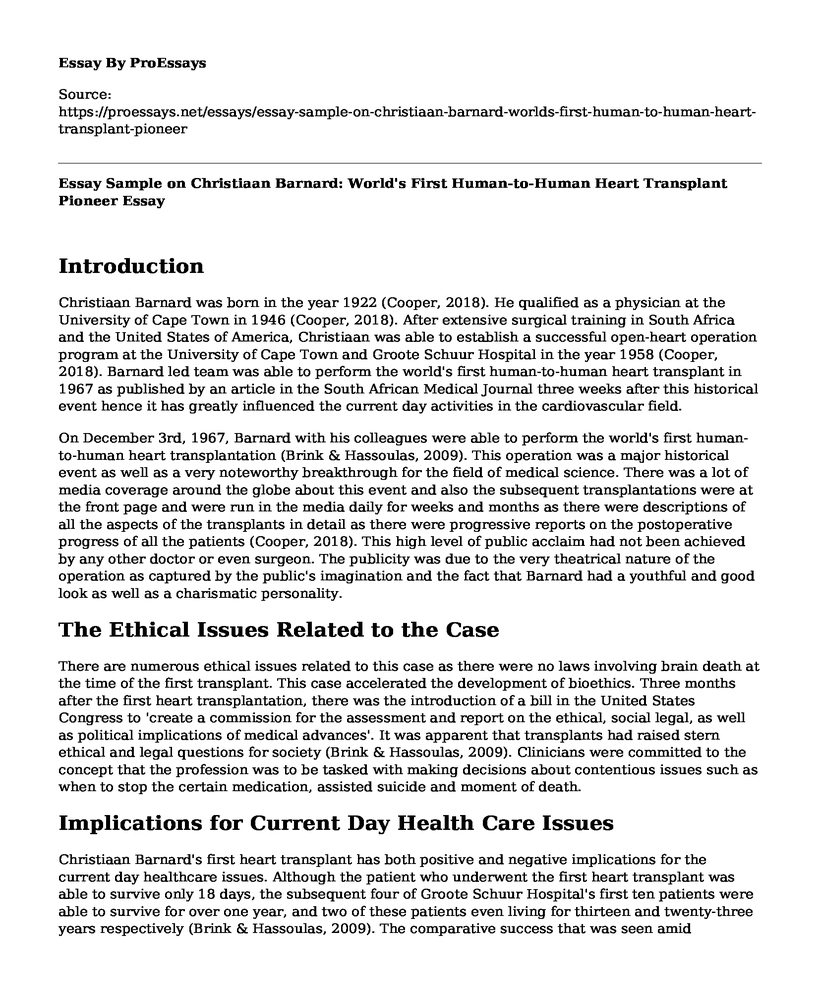Introduction
Christiaan Barnard was born in the year 1922 (Cooper, 2018). He qualified as a physician at the University of Cape Town in 1946 (Cooper, 2018). After extensive surgical training in South Africa and the United States of America, Christiaan was able to establish a successful open-heart operation program at the University of Cape Town and Groote Schuur Hospital in the year 1958 (Cooper, 2018). Barnard led team was able to perform the world's first human-to-human heart transplant in 1967 as published by an article in the South African Medical Journal three weeks after this historical event hence it has greatly influenced the current day activities in the cardiovascular field.
On December 3rd, 1967, Barnard with his colleagues were able to perform the world's first human-to-human heart transplantation (Brink & Hassoulas, 2009). This operation was a major historical event as well as a very noteworthy breakthrough for the field of medical science. There was a lot of media coverage around the globe about this event and also the subsequent transplantations were at the front page and were run in the media daily for weeks and months as there were descriptions of all the aspects of the transplants in detail as there were progressive reports on the postoperative progress of all the patients (Cooper, 2018). This high level of public acclaim had not been achieved by any other doctor or even surgeon. The publicity was due to the very theatrical nature of the operation as captured by the public's imagination and the fact that Barnard had a youthful and good look as well as a charismatic personality.
The Ethical Issues Related to the Case
There are numerous ethical issues related to this case as there were no laws involving brain death at the time of the first transplant. This case accelerated the development of bioethics. Three months after the first heart transplantation, there was the introduction of a bill in the United States Congress to 'create a commission for the assessment and report on the ethical, social legal, as well as political implications of medical advances'. It was apparent that transplants had raised stern ethical and legal questions for society (Brink & Hassoulas, 2009). Clinicians were committed to the concept that the profession was to be tasked with making decisions about contentious issues such as when to stop the certain medication, assisted suicide and moment of death.
Implications for Current Day Health Care Issues
Christiaan Barnard's first heart transplant has both positive and negative implications for the current day healthcare issues. Although the patient who underwent the first heart transplant was able to survive only 18 days, the subsequent four of Groote Schuur Hospital's first ten patients were able to survive for over one year, and two of these patients even living for thirteen and twenty-three years respectively (Brink & Hassoulas, 2009). The comparative success that was seen amid numerous failures worldwide did a lot to create shielded optimism that gives them hope that heart transplant would someday become a feasible therapeutic option for the patients.
The first heart transplantation done by Christiaan Barnard and the subsequent constant research in the field of cardiac transplant at the University of Cape Town as well as in the other few committed institutions over the consequent fifteen years formed the foundation for a heart transplant to become an entrenched method of therapy for the patient with end-stage cardiac conditions. During this era from the year 1968 to the year 1983, Barnard and his colleagues were able to continue to make key contributions to the field of organ transplantation, particularly the advancement and development of the heterotopic ('piggy-back') heart transplants (Cooper, 2018) advancement of the notion of brain death, donation of organs as well as other related ethical issues; improved preservation as well as protection of the donor heart (which included hypothermic perfusion storage of the heart; experiments and evaluation studies on the hemodynamic and also metabolic properties and effects of brain death; and the pioneering attempts at xenotransplantation.
References
Brink, J. G., & Hassoulas, J. (2009). The First Human Heart Transplant and Further Advances in Cardiac Transplantation at Groote Schuur Hospital and the University Of Cape Town. Cardiovascular Journal of Africa, 20(1), 31. Retrieved from: https://www.ncbi.nlm.nih.gov/pmc/articles/PMC4200566/
Cooper, D. K. (2018). Christiaan Barnard-The Surgeon Who Dared: The Story of The First Human-To-Human Heart Transplant. Global Cardiology Science & Practice, 2018(2). Retrieved from: https://www.ncbi.nlm.nih.gov/pmc/articles/PMC6062759/
Cite this page
Essay Sample on Christiaan Barnard: World's First Human-to-Human Heart Transplant Pioneer. (2023, Apr 23). Retrieved from https://proessays.net/essays/essay-sample-on-christiaan-barnard-worlds-first-human-to-human-heart-transplant-pioneer
If you are the original author of this essay and no longer wish to have it published on the ProEssays website, please click below to request its removal:
- Brief Synopsis of the Article on Patient-Centered Care
- Creating a Nursing Professional Development Plan Paper Example
- How Epilepsy Effects Athletics - Essay Sample
- Essay Sample on Health Considerations in Canada's Foreign Policy: Impact of Globalization
- Paper Sample on Long-Term Pain Management in Hospitals: The Role of Opioids
- Report Example on Combating Obesity: A Proposal for a Sustainable Solution
- Essay Example: 10 Microbial Agents & How to Prevent Foodborne Illness







